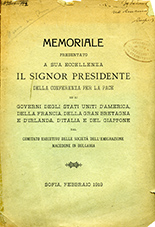
We kindly inform you that, as long as the subject affiliation of our 300.000+ articles is in progress, you might get unsufficient or no results on your third level or second level search. In this case, please broaden your search criteria.

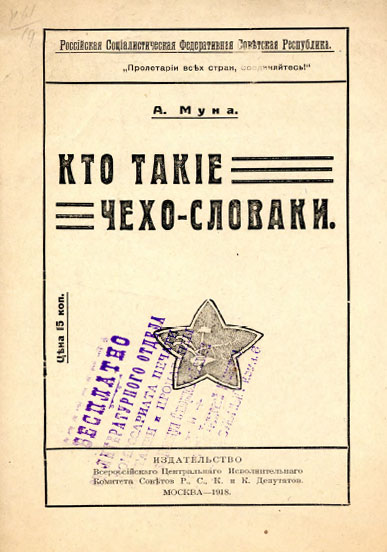

Ideals and delusions. Balkan War and catastrophe of 1913. The Great European war and involvement of Bulgaria. The 1918 catastrophe, its consequences for Bulgaria and the prospects. Published in 1926 by »Кооперативна печатница Гутенбергъ,«
More...
Author Iordan Georgiev is printed at the cover page as "Iordane Pope Guéorgieff". Second auhtor: " St. N. Chichkoff" The book is about: Aspect physique et population // Composition de la population sous le joug turc // Développement du grécisme jusqu'en 1872 // Développement du grécisme pendant les années 1872-1913 // a) Séparation des bulgares du Patriarcat . . . // b) La terreur grecque pendant les années 1902-1908 // c) Moyens divers // d) Ecoles // V. Conclusion. // VI Documents. // VII. Liste des documents // The Greek texts are translated into French. The list of documents can be downloaded in the introduction PDF file
More...
The paper aims to acquaint the readers with the exceedingly active multifarious activity of Queen Eleonore in the field of charity and philanthropy in Bulgaria, naturally related to the political, cultural and economic life in the country in the first years of the 20-th century, marked as they were by the struggle for national unification. The subject is researched for the first time, mainly on the basis of Bulgarian sources and the till sparse contemporary studies dedicated directly to the life and work of Queen Eleonore in Bulgaria and Europe in the field of charity. For the first time, the paper follows the appearance of the new queen in Bulgaria's social, political and cultural sphere: it marks out the parameters of action in the organization of charity in this country, as well as the first more widely advertised Bulgarian efforts on the international field on the part of the Bulgarian Red Cross (BRC) and the 'Samaritan' society she founded, which also had supporters across the ocean. It also speaks of the participation of Queen Eleonore in organizing nursing activities in support of the army during the Balkan War in 1912-1913 and the opportunities she constantly sought and found to provide medical aid to the army and the front lines during the Second Balkan War and in the years of the Treaty of Bucharest, which was determental to the Bulgaria. Her preparations for the official visit across the ocean at the invitation of the United States government allows us to follow her extremely responsible attitude to this top-ranking diplomatic mission which she considered extremely important and which she undertook in the name of Bulgaria's welfare.
More...
At the beginning of World War I Bulgaria remained neutral, waiting for favourable conditions to engage in the conflict. Its supreme political objective was national unification. The Balkan countries were under constant pressure of the warring coalitions that were trying to win new allies. No Balkan state was a master of the situation and each was afraid about it's back. Because of its geographic location Bulgaria had a strategic position in the Balkans and its joining one of the warring groups would have ensured its geopolitical advantage in the war. In the "Bulgarian summer of 1915" both warring coalitions tried to attract the country on their side, offering territorial compensations or awards. Germany's promises were taken as more reliable by the politicians and Bulgaria entered World War I as part of the Central Powers. The choice of the great allies proved wrong. What was more, the manner of selection was also wrong - not according to the possibility of final victory, but according to the bidding in the territorial auction the profit of which would be lost at the loss of the war.
More...
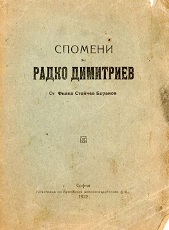
Radko Dimitriev (Bulgarian: Радко Димитриев) (24 September 1859 in Gradets – 18 October 1918 near Pyatigorsk) was a Bulgarian general, Head of the General Staff of the Bulgarian Army from 1 January 1904 to 28 March 1907, as well as a general in the Russian Army during the First World War. (Wikipedia)
More...
Volume I of the monograph of Oświęcim contains a presentation of the history of the surrounding land and an analysis of cultural aspects of the city's functioning. At first the authors analyze changes in the boundaries and routes, and route names from the earliest times to the present, and then show the political history of the region, which repeatedly changed its national, administrative and diocesan affiliation. The second part of the volume discusses the development of architecture and art. in Oświęcim, including the most important monuments and silhouettes of the most eminent artists, as well as the development of education. Also, prominent figures from Oświęcim were presented. The volume closes with a calendar of the city's history.
More...
Volume I of the monograph of Oświęcim contains a presentation of the history of the surrounding land and an analysis of cultural aspects of the city's functioning. At first the authors analyze changes in the boundaries and routes, and route names from the earliest times to the present, and then show the political history of the region, which repeatedly changed its national, administrative and diocesan affiliation. The second part of the volume discusses the development of architecture and art. in Oświęcim, including the most important monuments and silhouettes of the most eminent artists, as well as the development of education. Also, prominent figures from Oświęcim were presented. The volume closes with a calendar of the city's history.
More...
Volume I of the monograph of Oświęcim contains a presentation of the history of the surrounding land and an analysis of cultural aspects of the city's functioning. At first the authors analyze changes in the boundaries and routes, and route names from the earliest times to the present, and then show the political history of the region, which repeatedly changed its national, administrative and diocesan affiliation. The second part of the volume discusses the development of architecture and art. in Oświęcim, including the most important monuments and silhouettes of the most eminent artists, as well as the development of education. Also, prominent figures from Oświęcim were presented. The volume closes with a calendar of the city's history.
More...
Zbog ne posve nerazumljivih razloga historiografija od vajkada teži urediti povijest po razdobljima koja počinju s godinama s dvije nule na kraju, po „okruglim“ stoljećima, naime. Vjerojatno u nakani postizanja jednostavnosti (kao važnoga uvjeta široke prihvaćenosti) historiografijskih interpretacija uvodi se periodiziranje koje je zapravo posve izvanjsko na vlastitoj naravi povijesnih zbivanja. U novije vrijeme Eric Hobsbawm je ipak uveo u raspravu koncept „kratkoga dvadesetog stoljeća“ (1914.-1991.), primjenjujući, zapravo, na specifičan povijesni materijal koncept „zgušnjavanja povijesnoga vremena“ (koji predznačuje Benjamin u životno zaključnim tezama „O pojmu povijesti“).
More...
Beogradski istoričar objašnjava zbog čega je 1. decembra 1918. većina jugoslovenskih naroda oduševljeno ušla u Kraljevinu Srba, Hrvata i Slovenaca, da li je već Vidovdanski ustav iz 1921. nekima od njih srušio iluzije o mogućoj ravnopravnosti unutar nove države, šta je jugoslovenskim narodima donio AVNOJ i je li SFRJ zaista bila “naša prva Evropa”.
More...
U „građanskom ratu sećanja” ovih dana je na nov način oživljen Sarajevski atentat. Okvir je ostao tanato-politički, ali se više ne eksploatiše samožrtvovanje Principa nego smrt Ferdinanda. Ko je odgovoran za to što su mladobosanci od tiranoubica postali teroristi? Svi oni u regionu koji strepe od jugoslovenstva i svi oni iz okruženja koji žele da rasterete vlastite nacije od imperijalističke odgovornosti za klanicu Prvog svetskog rata. Da li će oni uveriti javnost da su atentatori bili teroristi? Verovatno hoće zato što Princip danas nema valjanog advokata. Srušene su one strukture koje su Principa iznedrile i koje su ga docnije opravdano heroizovale. Država Jugoslavija je Principu s razlogom dizala spomenike i po njemu imenovala ulice. Danas nikakva kohorta blistavih istoričara ne može odbraniti Principa zato što nema južnoslovenske države kao ostvarenja mutnog ideala koji je vodio mladobosance. A što se rečena država danas više shvata kao iluzija ili kao tamnica to su veće šanse da Princip o neslavnom jubileju bude stigmatizovan kao terorista.
More...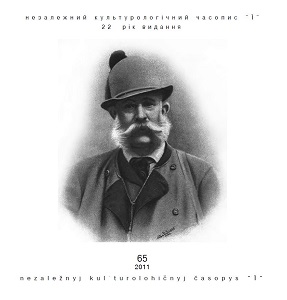
In order to make the thorough mendacity of Putin's rhetoric about "Ukraine as a State of Neo-Nazis" fully evident, CEEOL is offering the Ukrainian Jewish journal ”Ї“ as the strongest possible proof of a habit of "modern Ukrainian and world intellectual thought". The NGO "Ї", an independent cultural organization founded in the late 1980's in L'viv, focuses on modern Ukrainian and world intellectual thought. It offers periodic forums for discussion of issues concerning Ukraine and, among others, Europe, Russia, post-Byzantium, the Muslim Renaissance. It analyzes the current situation in order to develop future socio-political strategies. The organization also publishes "Ї", a quarterly journal dealing with European and Ukrainian issues in politics, philosophy, and culture. It also examines the relationship of Ukrainians with Russians, Poles, Austrians, and Jews and places Ukraine in a modern geopolitical sphere that can further Ukraine's identity as a modern state.
More...
Iz zbornika „Svakodnevica i društveni odgovori na epidemijske krize 1914-2020“, nastalog u okviru naučno-istraživačkog projekta „Čovek i društvo u vremenu krize“, urednik zbornika Milan Ristović, izdavač Filozofski fakultet Univerziteta u Beogradu 2021. U članku se prikazuje život Beograđana krajem 1918. U danima slavlja zbog oslobođenja, stvaranja Jugoslavije i povratka u normalni život, stanovnike je kosio Španski grip. U članku se prikazuju razlozi zbog kojih je pandemija prošla gotovo neopaženo, uprkos visokoj smrtnosti.
More...
Împlinirea unui secol de la răpirea Basarabiei de către Rusia ţaristă a prilejuit organizarea unor manifestaţii zgomotoase în Chişinău. La 3 mai 1912 a avut loc o adunare a zemstvei guberniale a Basarabiei sub preşedinţia directorului administrativ gubernial A. N. Iugan. Cu această ocazie, s-a discutat problema găsirii celor mai potrivite căi şi metode prin care să se convingă populaţia să vină la serbările ce se vor organiza pe 16 mai 1912. Autorităţile guberniale au decis ca în ziua jubileului să fie o adevărată sărbătoare. În acest scop, a fost aprobată suma de 20.000 de ruble pentru împodobirea şi iluminarea Palatului Gubernial din Chişinău şi alte 7000 de ruble repartizate celor şapte preşedinţi de judeţ. În total, pentru amintitele festivităţi s-au cheltuit 734.000 de ruble sau 1.800.000 de lei.
More...
Revenirea Basarabiei în componenţa României, la 27 martie/9 aprilie 1918, a deschis, printre altele, şi o serie de oportunităţi economice ce urmau să fie puse în practică, măsuri care, de altfel, trebuiau să facă parte dintr-un ansamblu general menit a integra şi economic provincia cu teritoriul Patriei-Mamă. Găsirea unor soluţii noi era necesară, deoarece lunga ocupaţie ţaristă a provinciei (1812-1918) dirijase fluxul majorităţii exporturilor basarabene către est, către centrul fostului Imperiu, şi, în consecinţă, infrastructura de transport terestră a Basarabiei în momentul Unirii cu România corespundea acestei realităţi.
More...
Un sumar bilanţ al activităţii portului Bugaz pe parcursul celor aproape opt ani, între redeschiderea traficului şi cedarea ocupantului sovietic, relevă rezultate pozitive pe mai multe paliere. Populaţia locală şi cea din hinterlandul portului, care a cuprins o regiune de 100 km din sudul Basarabiei, a beneficiat de un debuşeu pentru exportul produselor cerealiere, cu preţuri avantajoase şi stimulative. Navigaţia între Marea Neagră şi limanul Nistrului s-a îmbunătăţit ca urmare a amplasării balizelor şi instalaţiilor de acostare a navelor. De aceste facilităţi au beneficiat nu numai navele care veneau la încărcat, ci şi pescarii din zonă. Numărul locurilor de muncă, stabile şi temporare, a crescut. Portul Bugaz a provocat o mişcare economică şi comercială în sudul Basarabiei cu efecte în îmbunătăţirea transporturilor pe apă cu porturile Constanţa şi Sulina, de unde cerealele luau drumul spre pieţele din Orientul Mijlociu şi Occident. La Bugaz s-a derulat o activitate „determinată şi condusă în spirit naţional românesc”, într-o zonă cu o populaţie eterogenă şi cu o utilizare pentru comunicare „din ce în ce mai întinsă a limbii româneşti” . Indubitabil, portul Bugaz a contribuit la consolidarea procesului conexării Basarabiei la economia unitară a României.
More...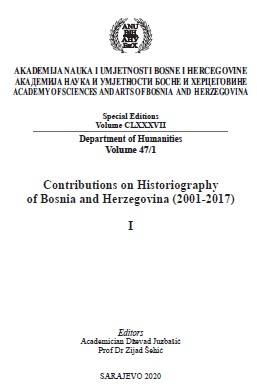
Based on the analysis and evaluation of the characteristics of historical science in Bosnia and Herzegovina over the period considered, several important facts need to be pointed out. The aggression against Bosnia and Herzegovina in 1992 had profound consequences on the state of Bosnia and Herzegovina's historiography and in its neighbourhood, and as a consequence there is an increased interest in the past and in seeking answers to current events in the past. Historical sciences have largely become an instrument of current policies, so little attention is paid to critical analyses of historical sources and their objective evaluation and interpretation. New interpretations of historical processes, while removing credible facts, have greatly influenced the formation of new approaches to historiography. Historiographic works are valued differently in Bosnia and Herzegovina, although many facts have been known before, so it is impossible to give a singular assessment of Bosnia and Herzegovina's historiography which considers the period of Austro-Hungarian rule in Bosnia and Herzegovina. Detailed insight into the structure of published historiographical works in Bosnia and Herzegovina shows that the treatment of certain aspects of Bosnia and Herzegovina's past is dominated by discussions, articles and short stories of unequal quality and scientific scope, as well as the lack of extensive, scientifically based studies, which are a prerequisite for the creation of historiographic syntheses. Although significant results have been achieved in Bosnian-Herzegovinian historiography in the study of political, economic and cultural developments in Bosnia and Herzegovina during the Austro-Hungarian period, there are several issues that have been neglected in historical science: the writing of a voluminous history of Bosnia and Herzegovina, the publication of source material of different provenance and thematic representation, study of population migration from 1878 to 1918, consideration of the economy and society of Bosnia and Herzegovina during the Austro-Hungarian rule of 1878-1918, review of socio-economic trends during the First World War, as well as depictions of Bosnia and Herzegovina in world travel literature.
More...